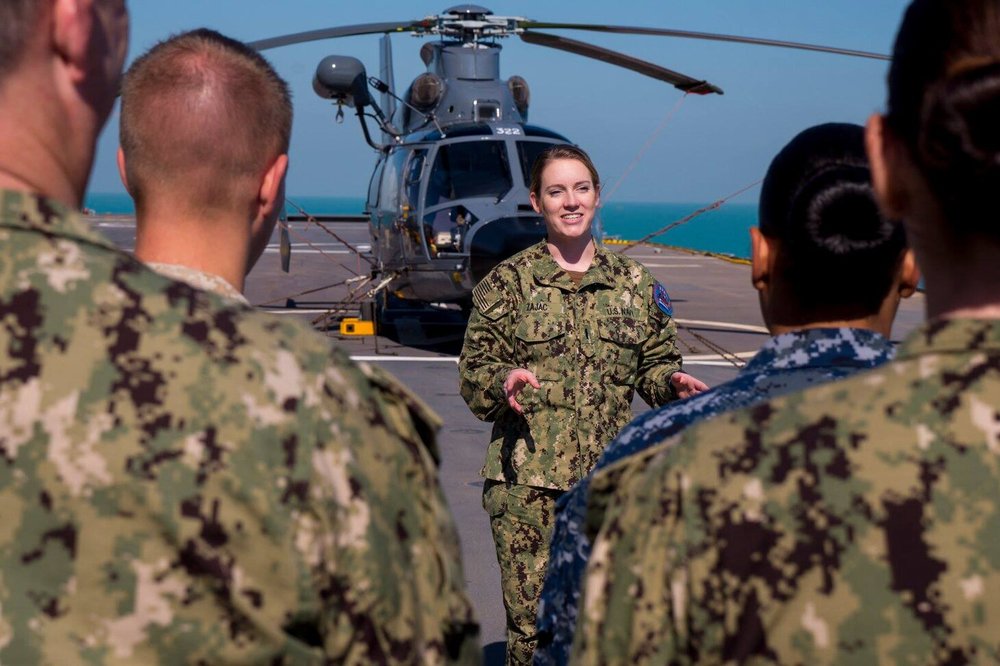Lt. Amy C. Zajac, Region Legal Service Office Europe, Africa, and Southwest Asia (EURAFSWA), served as staff judge advocate for U.S. military personnel aboard the French Navy Mistral-class LHD Tonnerre (L9014) as it executed a bilateral U.S.-French mission, the first of its kind, in the Persian Gulf, Red Sea, and Gulf of Aden. Lt. Amy C. Zajac, Region Legal Service Office Europe, Africa, and Southwest Asia (EURAFSWA), served as staff judge advocate for U.S. military personnel aboard the French Navy Mistral-class LHD Tonnerre (L9014) as it executed a bilateral U.S.-French mission, the first of its kind, in the Persian Gulf, Red Sea, and Gulf of Aden.
“Bois Belleau 100 was the first mission of its kind, a joint U.S.-French amphibious task group that demonstrated a drive for interoperability on an international scale” says Zajac. “Diplomacy was a constant consideration in our work with countries in the region and with the French command on board.” “Bois Belleau 100 was the first mission of its kind, a joint U.S.-French amphibious task group that demonstrated a drive for interoperability on an international scale” says Zajac. “Diplomacy was a constant consideration in our work with countries in the region and with the French command on board.”
Zajac consulted on rules of engagement and use of force during multinational exercises in the Middle East, including Alligator Dagger, Alligator Thunder, and Alligator Lightning; obtained diplomatic clearances for exercise sites, equipment, and personnel; and advised on DoD policies and bilateral agreements. Attached to Naval Amphibious Forces, Task Force 51, 5th Marine Expeditionary Brigade (TF 51/5), Zajac joined the element in Bahrain in early November before flying to Aqaba, Jordan to board the vessel. TF 51/5 integrates Navy and Marine Corps staff to effectively execute operations, respond to contingencies and crises, and conduct theater security cooperation at sea, from the sea, and ashore in support of U.S. Central Command theater objectives. Zajac consulted on rules of engagement and use of force during multinational exercises in the Middle East, including Alligator Dagger, Alligator Thunder, and Alligator Lightning; obtained diplomatic clearances for exercise sites, equipment, and personnel; and advised on DoD policies and bilateral agreements. Attached to Naval Amphibious Forces, Task Force 51, 5th Marine Expeditionary Brigade (TF 51/5), Zajac joined the element in Bahrain in early November before flying to Aqaba, Jordan to board the vessel. TF 51/5 integrates Navy and Marine Corps staff to effectively execute operations, respond to contingencies and crises, and conduct theater security cooperation at sea, from the sea, and ashore in support of U.S. Central Command theater objectives.
Brig. Gen. Francis Donovan, Commanding General, TF 51/5 described the mission as “an invaluable opportunity for the U.S. and France to enhance capabilities in critical mission sets inherent to our militaries operating in the U.S. Central Command’s area of responsibility.” Zajac joined the Defense Services Office in Naples, Italy at the conclusion of the operation. Brig. Gen. Francis Donovan, Commanding General, TF 51/5 described the mission as “an invaluable opportunity for the U.S. and France to enhance capabilities in critical mission sets inherent to our militaries operating in the U.S. Central Command’s area of responsibility.” Zajac joined the Defense Services Office in Naples, Italy at the conclusion of the operation.
Originally from Moorestown, New Jersey, Zajac commissioned in the U.S. Navy JAG Corps after graduating from New York University School of Law to pursue a career that combines commitment to public service and involvement in novel legal issues, both domestic and international. “The opportunity to collaborate not only with other U.S. military branches, but also with French and Emirati military personnel was an unparalleled experience. Originally from Moorestown, New Jersey, Zajac commissioned in the U.S. Navy JAG Corps after graduating from New York University School of Law to pursue a career that combines commitment to public service and involvement in novel legal issues, both domestic and international. “The opportunity to collaborate not only with other U.S. military branches, but also with French and Emirati military personnel was an unparalleled experience.
The headquarters joint-command was a truly integrated effort that relied on constant communication, cooperation, and cultural awareness,” she says. “As a first-tour judge advocate, the extended underway accelerated my understanding of both Navy and Marine Corps operations, and allowed me to dive into operational and international law early in my career.” The headquarters joint-command was a truly integrated effort that relied on constant communication, cooperation, and cultural awareness,” she says. “As a first-tour judge advocate, the extended underway accelerated my understanding of both Navy and Marine Corps operations, and allowed me to dive into operational and international law early in my career.”
